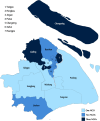Non-governmental organizations' perceptions of challenges and opportunities for participating in the provision of government-purchased community-based psychiatric rehabilitation services in Shanghai, China: a qualitative study
- PMID: 39748366
- PMCID: PMC11694460
- DOI: 10.1186/s12913-024-12125-2
Non-governmental organizations' perceptions of challenges and opportunities for participating in the provision of government-purchased community-based psychiatric rehabilitation services in Shanghai, China: a qualitative study
Abstract
Background: In recent years, the Chinese government has increased its support for the development of community-based psychiatric rehabilitation (CBPR) services and initiated pilot programs for government purchasing of CBPR services from non-governmental organizations (NGOs) in order to address the inadequacy of the government's own supply capacity of CBPR services. This study investigated how the NGOs in Shanghai perceived the challenges and opportunities for participating in the provision of government-purchased CBPR services.
Methods: A qualitative descriptive approach was employed in this study. The local NGOs' program directors who had been responsible for the provision of government-purchased CBPR services in Shanghai were interviewed regarding their perceptions of the challenges and opportunities. Interview transcripts were coded and analyzed using Braun and Clarke's thematic analysis method.
Results: A total of 19 NGOs' program directors were interviewed. The challenges perceived by them for NGOs to participate in the provision of government-purchased CBPR services included difficulty with engaging individuals with mental illness and their families, lack of resources, lack of knowledge and skills, inadequate collaborations with other stakeholders, and limitations of services. The opportunities could be grouped into external and internal ones. External opportunities included China's favorable policy environment, Shanghai's developed economic environment, and increased public awareness of mental health, while internal opportunities included NGOs' greater flexibility, high team cohesion, stronger focus on the holistic needs of clients, better resource integration capabilities, and ability to provide long-term follow-up and support for clients.
Conclusions: Based on the findings, recommendations for future actions are provided in the areas of research, public awareness, funding, training, referrals, collaboration, and service designing to improve the mechanism of government purchasing of CBPR services from NGOs in China.
Keywords: China; Community-based psychiatric rehabilitation; Government service purchasing; Non-governmental organization; Qualitative study.
© 2024. The Author(s).
Conflict of interest statement
Declarations. Ethics approval and consent to participate: This study was performed in accordance with the Declaration of Helsinki and was approved by the Medical Research Ethics Committee of the School of Public Health of Fudan University (IRB No. 2021–09-0916). Following a detailed description of the study, a verbal informed consent was obtained from all participants. Consent for publication: Not applicable. Competing interests: The authors declare no competing interests.
Figures


References
-
- Anthony WA. Recovery from mental illness: the guiding vision of the mental health service system in the 1990s. Psychosoc Rehabil J. 1993;16:11–23.
-
- Li N, Du W, Chen G, Song X, Zheng X. Mental health service use among Chinese adults with mental disabilities: a national survey. Psychiatr Serv. 2013;64:638–44. - PubMed
-
- National Health and Family Planning Commission of the People’s Republic of China, Central Public Security Comprehensive Management Commission of the People’s Republic of China, National Development and Reform Commission of the People’s Republic of China, Ministry of Education of the People’s Republic of China, Ministry of Public Security of the People’s Republic of China, Ministry of Civil Affairs of the People’s Republic of China, et al. National Mental Health Work Plan (2015–2020). 2015.
MeSH terms
LinkOut - more resources
Full Text Sources
Medical

